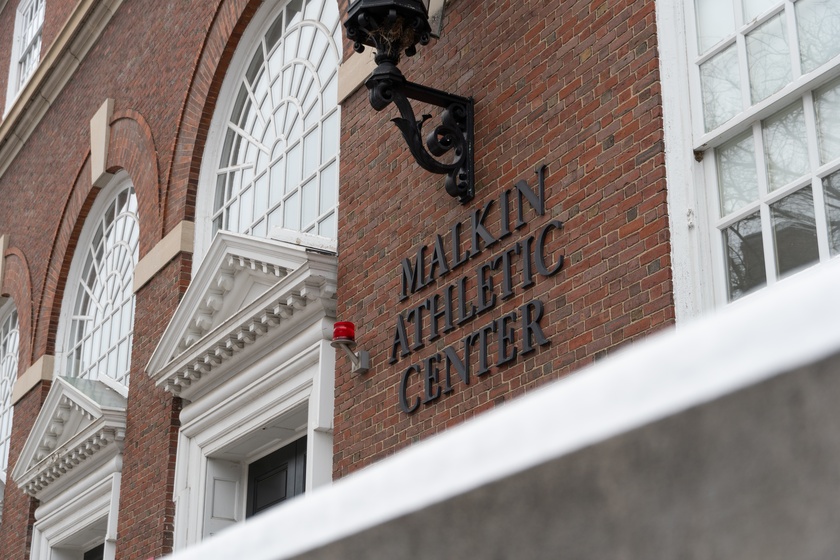{shortcode-7596843ac5c892c49dd66519dbecc908ecf14182}
Every Sunday evening at 7 p.m., voices echo and pickleballs bounce off the walls of the Malkin Athletic Center. This is Harvard Pickleball Club’s weekly open play practice, where dozens of players line the perimeter of the court holding custom-made crimson and white Joola paddles. HPC’s Instagram bio boasts that this is the “hottest new club on campus.”
At HPC practice, I learn that pickleball has its own vocabulary: the kitchen is the box at the front of the court, and “dinking” means hitting the ball back and forth for practice without a net. The game of pickleball resembles a mashup of tennis and ping-pong — two pairs of two players, with paddles in hand, face off across a net. Pickleballs look like wiffle balls, and they emit a rhythmic pitch as they bounce.
Paddles are lined up along one side of each court, representing a queue of waiting players. When each match ends, all four players on the court meet at the net to touch paddles. Then, the losing pair runs off as the winning players stay on. Energy is high, and players transition between matches quickly to fit in as many games as possible intothe 90-minute practice.
This newly-founded club sport team has something of a rags-to-riches story. The group was founded by two varsity student athletes who needed a break from the whirlwind of Division I athletics and stressful academics. HPC’s open-play practices welcome newcomers; its leaders run the group with an entrepreneurial mindset, seeking out opportunities for growth and business partnerships.
According to Elle E. Freedman ’25, a co-founder and co-president of the club, HPC has hosted 156 practices, accumulated a membership of over 500, and sent a competition team to three national pickleball tournaments in the past year alone.
Freedman and Cole H. Cleary ’25, the club’s other co-founder and co-president, submitted a proposal to the Club Sports Office in 2023. The club was approved for an official trial period that November. The trial period was their “sink or swim moment,” Freedman says, where court space was provided without additional team funding. HPC’s first practice as a recognized club sport took place in Fall 2024.
Freedman, who used to play a varsity athlete on the women’s field hockey team, says that in moments when she “lost a love for the sport,” she used pickleball as an outlet to reconnect with people in a judgment-free athletic environment. Cleary is also a varsity athlete, playing for both the men’s baseball and football teams.
Austin D. Barkas ’26, vice president of HPC, says that pickleball reaches a “broader audience” because, compared to other sports like tennis, the nature of pickleball lends to smaller gaps in skill level between newcomers and seasoned players. In pickleball, he says, many players have a “we’d love to have you, come play” mentality.
HPC’s membership is split into a competition team and an open-play group in an effort to maintain both competitive spirit and inclusivity for beginners. The competition team includes 56 players vetted through a tryout process, while the open play group welcomes those eager to learn in a non-competitive space.
“You have the varsity football player playing against the CS major. Like, in what other context will these two be playing a sport?” Freedman says.
Oreck N. Frazier ’25, a competitive player on the team, is a senior on the varsity football team and routinely skips dinner to attend pickleball practice.
“I was always here, and it was always the best part of my week,” says Frazier. “One thing that we stress and emphasize is fun over everything else.”
In addition to finding good fun through playing pickleball, Frazier appreciates competing at the national level, which he says pushes him and others on the team to get better at the sport. “I thought that I was decent at pickleball, and then when I found out how people on the pro level really play, it was kind of like a rude awakening. So I’ve been very motivated to get better ever since then,” says Frazier.
“The board, especially, has shown immense leadership,” he says.
“This is like my own startup,” Freedman says. She has reached out to Harvard alumni and pickleball companies to help the team grow. In 2025, pickleball gear company Joola partnered with the club to provide monogrammed HPC paddles. Online, regular Joola pickleball paddles tend to range from $100 to $300. There are two ways to get an HPC customized paddle: becoming a competitive member of the team or making a donation of more than $200 to HPC.
The group is now trying to grow pickleball’s presence at Harvard and in the Ivy League.
“Pickleball isn’t for grandmas,” says Freedman. “If you need proof, there’s 500 other people at Harvard who would convince you otherwise.”
—Magazine Editor-at-Large Vivian W. Rong can be reached at vivian.rong@thecrimson.com.


